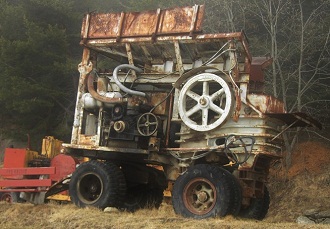Robots with PhDs Japan Scientists working for the Fujitsu Company are
building a robot that can pass the entrance exams for the University of Tokyo. They
are confident that the robot will be ready to compete with and eventually beat
human applicants as early as 2021. It should be able to understand several
foreign languages, calculate and argue.
Source: vanguardngr.com, Sept 12, 2012
FURTHER READING > here
 2005 by Kurt Koehler @ realitybroker.org 2005 by Kurt Koehler @ realitybroker.org
Vagrant wolves in the Canton of Bern
Bern, Switzerland
Local authorities report a total of 8 wolf activities in the Canton of
Bern for 2012. These activities make for almost one fourth of the 35
activities documented for the same region since 2006. However, it is
unclear how many wolves are responsible for said activities. Some
wolves are known to walk 1'550 kilometers in less than 50 days, even
crossing motorways.
Little
is known to date about how wolves migrate, dwell, socialize and breed.
Wolves still challenge scientists, as they are considered to be very
distrustful and discrete animals. Experts say that wolves are
headstrong and resentful, which makes it difficult to monitor them over
a longer period of time.
It
is probable that the popularity of the Canton of Bern among wolves has
a connection to the relatively low density of human population in the
area. Conversely, not a single wolf activity has been reported in the
Greater Zurich area for many years, one of the most densely populated
regions of Switzerland.
Source: kora.ch, 2012
FURTHER READING (MOSTLY IN GERMAN) > here
Low life expectancy of solo artists Scientists have published a study on how membership in a band as
opposed to solo careering can have positive effects on life expectancy.
According to the study, solo artists are twice as likely as band
members to die prematurely. 1 in 10 European solo artists and even 1 in
5 North American solo artists dies early,
the average age of death being 39 and 45, respectively. The study
suggests that the social component of band membership has a protective
effect on the individual members.Source: bbc.co.uk, Dec 20, 2012
| | | | Printing out a Moon colony
One
of the main problems with colonizing our Moon is one which many may not
be
aware of: It costs USD 100'000 to get just 1 kilogram of material from
Earth to the Moon, which is why space agencies are constantly working
on finding
ways to make spacecraft lighter and to reduce the weight of cargo.
Oxygen tanks and optical instruments are one thing, but filling a
spacecraft with construction material from Earth would be a whole
different story. How practical then that the Moon is covered with rocks
and dust that would make ideal material for a lunar base. All that is
missing now is a crew of construction workers adventurous enough
to fly to the Moon.
The European Space Agency is currently
experimenting with a cutting-edge 3D printer that has been programmed
to "print out" a dome structure with highly supportive cellular walls,
using soil that is similar to that on the Moon. A lunar base must be
able to protect its inhabitants from micrometeoroids and radiation, so
a "print" will have to undergo various tests.
Water constitutes a similar logistical challenge as building material for a permanent lunar settlement. In 2011, it was reported
that there are substantial water reserves under the surface of the
Moon. When science finds a way to access these reserves, Earthlings
will be a further step closer to colonizing the Moon.
Source: esa.int, Jan 31, 2013
FURTHER READING > here
2012 by Expedition
I:T:L:I:E @ realitybroker.org
Max the Stork dies in Spain at 13
Born in
Avenches, Switzerland in May 1999, the large bird was connected to a
radio transmitter at an early age. In 2002, Max turned out to be a she.
The satellite-linked transmitter enabled scientists to
determine the stork's exact whereabouts and follow its migration
patterns. Max was known to spend her winters in Morocco and Spain.
Max is the best-tracked animal to date. About half of the storks die before turning one. Internet
users all over the world followed the migration of the famous stork
with enthusiasm. In 2010, Max appeared on the cover of French
magazine Nos Oiseaux.
Scientists found the dead bird
in December 2012, but could not determine the cause of death, since
scavengers had eaten most of its remains. The 22 gram tracking device was found
near a power line.
Source: Musée d'histoire naturelle Fribourg
|
